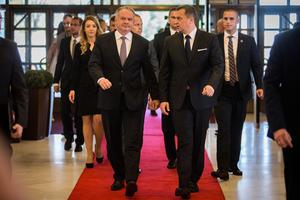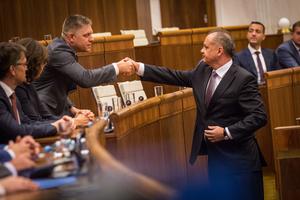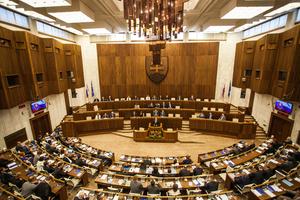It has become a tradition that every year around the anniversary of his inauguration, President Andrej Kiska applies his constitutional right to present his state of the republic address in the parliament. On the afternoon of June 14, MPs and government ministers gathered in the parliament to hear from the president what he believes the country needs to be doing better.
“The main challenge of today is that all citizens in Slovakia feel part of the success,” Kiska told the MPs in his state of the republic address. Here are the 10 main points of his speech:
1. Economic growth creates space to solve problems
Kiska praised the economic growth and dropping unemployment rate but pointed out the acute lack of labor force that Slovakia is experiencing and the ways that migration could benefit the Slovak economy.
With the hope that the administration will soon achieve a balanced budget, the government should be improving and modernising to provide more effective help to people in need, the president said.
“We have never in the 25-year history of modern Slovakia had such a wide space to solve the big, fundamental problems that are troubling us in the long run,” he said. He noted that Slovakia has learned good examples abroad and success stories at home and possesses the money, concepts and plans to solve its most enduring problems.
2. No focus, no ambition
Kiska repeated from last year that he feels there is a lack of focus on what is important, a lack of courage to name a measurable target and, overall, a lack of ambition.
“It is unsustainable to have political elites who agree about what the main weaknesses of Slovakia are - education, health care, quality of life in the regions, excluded Roma communities, ageing population, innovation potential of the country - but led the country’s most visible and noisy discussions about other things,” Kiska said. “Oftentimes they were about petty issues full of personal aversion.”
There is no wonder that people’s feeling of alienation between everyday life and the politics that they watch on the news is growing stronger in our society,” Kiska said.
3. Health care and education faded
Health care and education were part of the focus of Kiska’s address last year, and continue to be in the president’s focus in 2017.
“These topics have gradually faded from the centre of discussion to the margins,” Kiska said.
Kiska also mentioned that the generation of secondary school students is a target for extremists. He said that it is necessary for the Education Ministry to come forward with, at minimum, a proposal to strengthen media education at schools to give young people the basic skills to work with information.
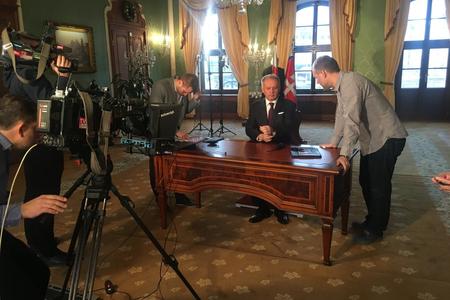
4. Corruption was turned into a war of politicians
One of the main reasons why people have resigned themselves from politics is their lack of trust in the ability of the state to punish those who violate rules - the poorly-led fight against corruption and cronyism.
Not even the biggest optimist could say that the engagement of politicians up to this point has satisfied citizens, Kiska said, stressing the need for politicians to show the courage to take responsibility.
Kiska also mentioned that Slovakia has the highest rate of citizens in the EU who do not want to report corruption because they do not believe that reporting will lead to any punishment for the culprits.
“Corruption is not just a topic where the political declarations are in conflict with the results,” Kiska said. “The fight against corruption has turned into a personal political war that has paralysed Slovakia. The state and its representatives have abandoned normal communication with the public and have abandoned their duty to patiently explain doubts and respond to suspicions.”
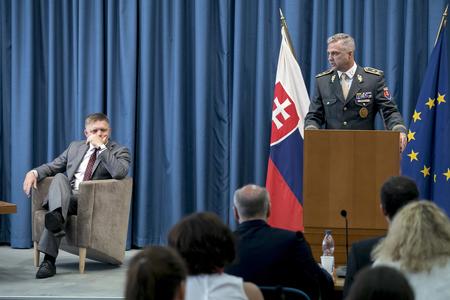
5. Kaliňák wasted the chance to leave
The recent anti-corruption initiatives demanded the resignation of Interior Minister Robert Kaliňák because of allegations of his involvement with tycoon Ladislav Bašternák. In his speech, Kiska alluded to the minister without naming him.
He recalled that one year ago, during his 2016 address to the parliament, he had said that “tracing political responsibility is not a solution to any scandal but a gesture that can calm the public and allow the responsible institutions to work”. He pointed out that people are now protesting in the streets and calling for that same minister to step down.
“How can all the changes in anti-corruption laws look trustworthy? How can these efforts be perceived as sincere when we have become stuck on the political fate of people who have long ago missed their opportunity to leave on their own?” Kiska asked in his recent address.
6. Protesters are our allies
President Kiska called on politicians not to trivialize the efforts of young people protesting against corruption.
“They are our allies amidst the prevailing resignation, lack of trust, and anger,” Kiska said of the students who organised and took part in the protests, emphasizing that these people do not call for radical changes but trust that the democratic institutions can still be repaired.
“They deserve respect and a signal that politicians are ready to move forward,” Kiska said.
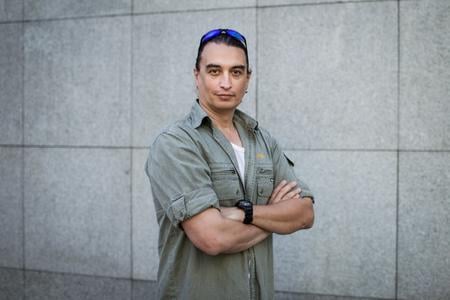
7. We need to be in the core of integration
President Kiska also noted that we are taking the benefits of integration for granted and that we must keep reminding ourselves that it is an issue of strategic importance. Kiska repeated that EU and NATO membership are essential for Slovakia’s security, prosperity, and livelihood.
At the same time, he stressed that the EU is a political project, not just an economic alliance, and if there is a new integration core, it will again be based on political bonds between countries who “understand that the further success of the union depends on the ability to act effectively”.
Speaking to the local politicians, Kiska stressed that it is not serving our country well when politicians angrily chant uncompromising attitudes “from the periphery of European politics”. They should instead aspire to seek compromise solutions in the core of the EU, or as Kiska put it, “in the first league of European politics”.
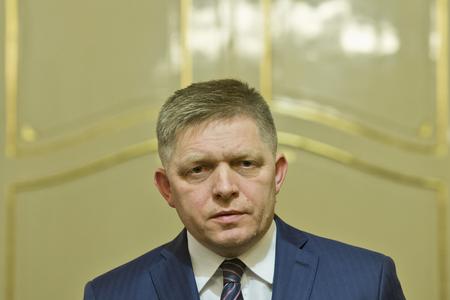
8. Fascists in the parliament
Speaking in front of the MPs, including deputies for the far right ĽSNS, Kiska called the party’s MPs fascists and admitted that the country is still trying to come to terms with the fact that they are now in the parliament.
He called on everyone in the country to listen to each other and to talk:
“Try to understand what troubles us - why part of the society is willing to support a fascist party,” he said. “Do we all understand the threat for our democracy, freedom and future that LSNS and similar organisations represent?”
But he also stressed that extremists need to be defeated in direct competition: “Address voters with a better and more attractive offer; do not give in to extremists and, in the name of dubious tactics, adopt their hateful vocabulary and ideas and help them radicalise sentiments in our society.”
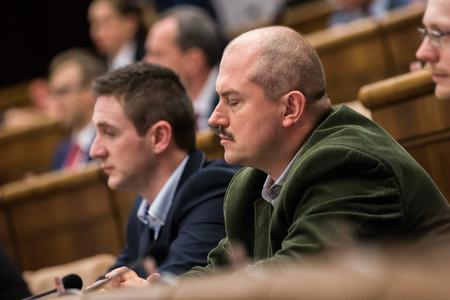
9. Media need to be free
As the MPs are preparing to vote on the new director of the public-service broadcaster RTVS, Kiska called on them to remember that independent and trustworthy media are essential for the country’s ability to defend itself from disinformation. Trust in media has also become an issue of the state’s security.
Strong, independent and trustworthy media stand against propaganda websites, radios, and magazines, Kiska noted.
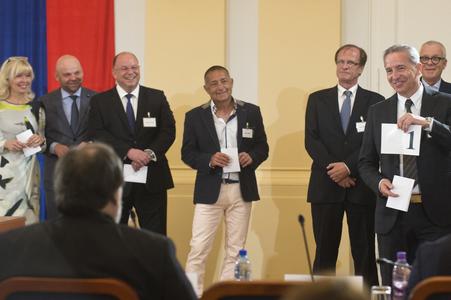
10. Roma potential rather than Roma problem
While Slovakia is a successful country, not all its citizens are able to experience the benefits of that success in their daily lives. Kiska listed the vulnerable groups, like pensioners or single mothers, who can hardly see success but, rather, feel forgotten. Kiska brought attention to Roma communities in particular and stressed that in the long run, unless they are doing well, Slovakia will not be doing well either.
“The attempts for solutions that have been made so far have lacked real political determination, clear goals, accountability for their fulfillment and coordination of the responsible institutions,” Kiska said and called on politicians to stop talking about Roma problems and instead discuss Roma potential.
Kiska suggested that the government could have one member to deal with Roma-related issues, “since the politically weak proxy has only limited possibilities”.



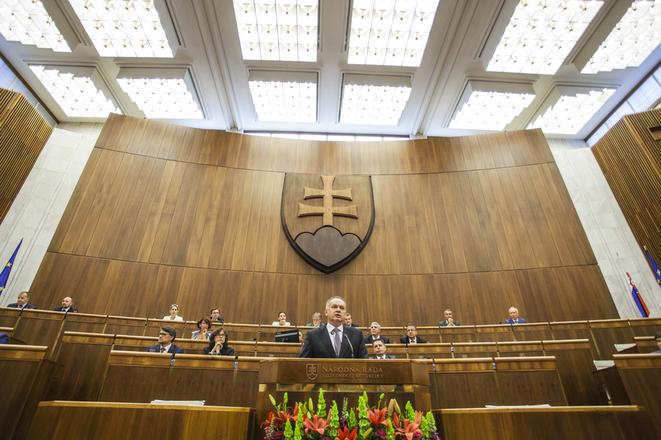 (source: TASR)
(source: TASR)
